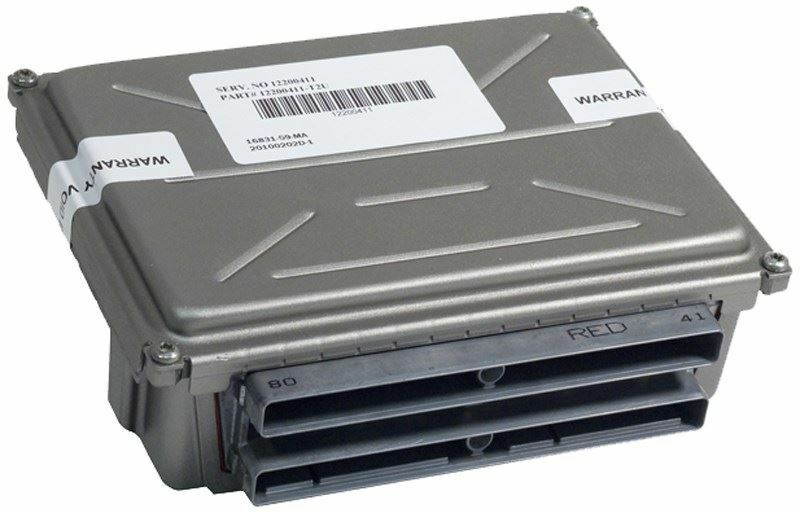Restore Peak Performance to Your GM Truck or SUV
Is your trusty 2004 GM truck or SUV letting you down? If you’re battling a persistent check engine light, experiencing baffling performance issues like rough idling, poor fuel economy, or harsh shifting, the problem often lies with the vehicle’s central command center: the Powertrain Control Module. This isn’t just a part; it’s the brain of your engine. When it falters, the entire vehicle suffers. We offer a direct, reliable solution with this Powertrain Control Module, service number 12586242, which comes fully programmed with the latest GM software updates tailored specifically to your vehicle’s VIN. Forget the dealership hassle and high costs—get back the smooth, dependable performance you rely on.
Warning Signs and How to Overcome Them
A failing PCM can manifest in numerous ways, often mimicking other sensor failures. Here’s how this replacement module brings your vehicle back to life:
- ✔ Eliminates Frustrating Starting Issues: Puts an end to no-start or intermittent start conditions, giving you confidence every time you turn the key.
- ✔ Clears Critical Fault Codes: Directly addresses Diagnostic Trouble Codes (DTCs) like P0601 (Internal Control Module Memory Check Sum Error) and P0606 (PCM Processor Fault) that point to a failing computer.
- ✔ Restores Smooth Shifting: Corrects erratic or delayed shifting in your automatic transmission by ensuring proper communication between the engine and gearbox.
- ✔ Improves Engine Performance: Resolves issues like rough idling, stalling, and poor acceleration, making your vehicle responsive and enjoyable to drive again.
- ✔ Boosts Fuel Efficiency: By restoring precise fuel and timing calculations, a new PCM can help you regain lost MPGs.
- ✔ Guaranteed Compatibility: Programmed to your VIN, this module is a plug-and-play solution, ensuring all vehicle-specific options and parameters are correctly configured from the start.
From the Mechanic’s Bay: A Diagnostic Journey
I once had a 2004 Silverado in the shop with a ghost of a problem. The owner had replaced the throttle body, mass air flow sensor, and multiple O2 sensors chasing a persistent stalling issue. The truck would run fine for a few miles, then just die at a stoplight. No codes, then a flurry of them. After hours of diagnostics, we traced it back to the PCM itself. The internal processor was failing intermittently under heat. Installing a correctly programmed 2004 GM PCM didn’t just fix the stall—it made the truck run smoother than it had in years. It’s a powerful reminder that sometimes, the solution lies with the brain, not the limbs.
Guided Installation to Restore Peace of Mind
Replacing your PCM is a straightforward job you can tackle with basic hand tools. This guide will walk you through it, but always consult a vehicle-specific repair manual if you’re unsure. Safety first!
- Safety First: Begin by disconnecting the negative terminal from your vehicle’s battery to prevent any electrical shorts.
- Locate the PCM: On most 2004 GM trucks and SUVs, you’ll find the PCM in the engine bay, typically on the driver’s side under the battery tray or next to the air filter box.
- Disconnect the Harnesses: Carefully disengage the locking tabs on the electrical connectors and pull them straight out from the module. There are usually two or three large connectors. Avoid forcing them.
- Remove the Old Module: Unbolt the PCM from its mounting bracket. Keep the hardware safe, as you’ll need it for the new unit.
- Install the New PCM: Mount your new, pre-programmed PCM onto the bracket and secure it with the original hardware.
- Reconnect Everything: Firmly plug the electrical harnesses back into the new PCM until they click into place. Reconnect the negative battery terminal.
- Perform Security Relearn: Your vehicle may require a security relearn procedure to recognize the new PCM. This typically involves turning the key to the ‘ON’ position for 10-15 minutes, then off, and repeating two more times before starting the engine. This allows the anti-theft system to sync with the new module.
Tailored Fit for Your Ride: The 2004 GM PCM
This module is the correct replacement for a wide range of 2004 General Motors vehicles. Please verify your service number (found on the PCM’s sticker) matches one of the following: 12586242, 19299226, 89017738, YFKD, YFKF, YFKH, YFKJ, YFKX, YFXL, YFXM, YFXN, YFXP, or YHTN.
Compatible Models Include (but not limited to):
- Buick Rainier (5.3L)
- Cadillac Escalade, ESV, EXT
- Chevrolet Avalanche 1500
- Chevrolet Silverado 1500, 2500, 3500 (Gasoline Engines)
- Chevrolet SSR
- Chevrolet Suburban 1500, 2500
- Chevrolet Tahoe
- Chevrolet Trailblazer EXT (5.3L)
- GMC Envoy XL, XUV (5.3L)
- GMC Sierra 1500, 2500, 3500 (Gasoline Engines)
- GMC Sierra Denali
- GMC Yukon, Yukon XL
- Hummer H2
- Isuzu Ascender (5.3L)
After purchase, simply provide us with your VIN. We’ll handle the programming, ensuring the module is ready to install the moment it arrives. It’s the most reliable way to get your vehicle back on the road and running right.
Frequently Asked Questions
What information do you need to program the PCM?
All we need is your vehicle’s 17-digit Vehicle Identification Number (VIN). This allows us to load the exact factory software and calibrations for your specific make, model, engine, and options.
Is this part truly plug-and-play?
Yes, because we program it to your VIN, it is ready to be installed without needing a trip to a dealer for software flashing. However, you will likely need to perform a simple security relearn procedure (as outlined in the installation steps) which takes about 30 minutes and requires only your car key.
Where can I find my vehicle’s VIN?
Your VIN can be found on a metal tag on the driver’s side of the dashboard (visible through the windshield), on the driver’s side door jamb sticker, or on your vehicle’s registration and insurance documents.
How can I be sure my PCM is the problem?
While the symptoms listed are strong indicators, it’s always best to have a proper diagnosis. Common signs of a bad PCM include specific trouble codes (like P0601), multiple unrelated sensor codes appearing at once, or intermittent issues that can’t be traced to a physical sensor or wire.
Will this fix my transmission shifting problems?
In many cases, yes. The PCM controls the transmission’s shift points and line pressure. If the module is failing, it can cause hard shifts, delayed engagement, or hunting for gears. This programmed replacement restores that critical communication.


